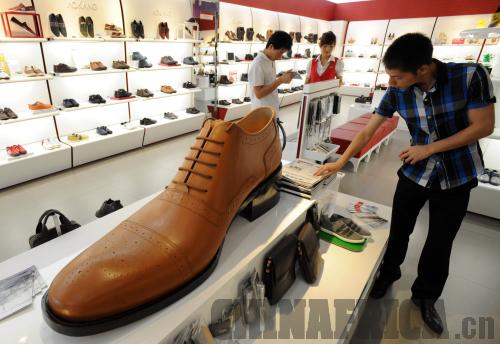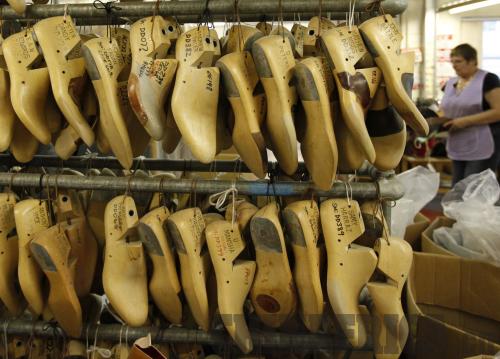| 
Huajian Group Ethiopia produces more than 2,000 pairs of shoes daily, creating more than 2,000 local jobs
Meeting with Meles Zenawi, former Prime
Minister of Ethiopia, was both a valuable personal experience and a turning point for Zhang Huarong's overseas business expansion.
Zhang, 55, runs the Huajian Group, a well-known shoe manufacturer employing about 25,000 workers on the Chinese mainland. Based in Dongguan, in southChina's Guangdong Province, Huajian makes shoes for global brands including Tommy Hilfiger and Guess.
Zhang met Zenawi in Guangdong at the opening ceremony of the World University Games in August 2011, where Zenawi invited him to visit Ethiopia to see about setting up a business there.
"I immediately decided to set up a factory when I visited Ethiopia," Zhang recalled, and within three months, his business was up and running.
Located at a huge industrial site in Addis Ababa that locals call "China Town," the factory began production in January 2012, with 600 employees working on two production lines. It has since expanded to three production lines, producing more than 2,000 pairs of shoes every day for the European and U.S. markets, and creating more than 2,000 local jobs.
Although Zhang's business venture seemed risky on the surface, he actually gave it careful thought, realizing that Ethiopia's comparative advantages in wage levels and natural resources were conducive to expanding his operation to foreign shores.
Ethiopia advantages
As China's economy expands, the rising cost of labor is eroding the nation's manufacturing advantage, a trend that is likely to accelerate in the coming years. "China's manufacturing industry has to be upgraded to be capital- and technology-intensive. Accordingly, labor-intensive manufacturing factories need to be relocated to other regions," said Justin Lin, Professor at Peking University's National School of Development, at the institution's quarterly seminar held on July 20.
Lin believes that Africa is a favorable destination for the relocation of manufacturing facilities. Although labor costs in central and west China are lower than in China's eastern coastal provinces, most of the surplus labor forces in these regions have already migrated east. "Besides, transportation infrastructure has been greatly improved in the past few years. Wages in China's previously less developed regions are catching up. Because of this, moving light manufacturing factories abroad is in line with economic principles," said Lin.
While it would appear that Viet Nam and Cambodia are better options than Ethiopia, as they both have lower labor costs and are closer to China, Lin thinks the two nations' small populations cannot meet the demands of China's manufacturing industry, which employs approximately 150 million workers. "Wages in southeast Asian countries are also on the rise," added Lin.
Africa has a large labor force with its population of 1 billion, especially as Africa's young people make up as much as 36 percent of the continent's total working-age population. Ethiopia has a population of about 91 million, and the average monthly wage of an ordinary worker in a shoe-making factory is about 800 Ethiopian Birrs ($42.28), according to a merchant notice issued by China's Ministry of Commerce in June last year.
"This is much lower than the labor costs in China. And the power supply is also cheaper, costing half of what it would in China and being sufficient as well," said Hai Yu, Vice President of Huajian Group. She is in charge of the company's factory in Ethiopia.
Abundant resources are another attraction. Figures from the Ethiopian Leather Industries Association show that the country has Africa's biggest livestock population, with about 41 million cattle, 25 million sheep and 23 million goats. Climate conditions make Ethiopian animal skins among the best in the world.
The country also has duty-free and quota-free access to U.S. and European Union markets for light manufacturers under the Africa Growth and Opportunity Act and the Cotonou Agreement. Moreover, the 43-year-long friendly relationship between China and Ethiopia, as well as supportive policies by both governments, also create favorable conditions for Chinese enterprises to expand business there, said Hai.
"Chinese shoemakers in Ethiopia create jobs for locals and improve their livelihood," said Lin.

Localization challenges
Huajian pays much attention to teaching skills to enable Africans to make goods themselves. "Training is always the core of our strategy," said Hai. She said that to date 386 Ethiopians had been taught shoe-making skills in China.
The company's production also increased Ethiopia's export of leather products and, after only one year of the factory operation, it contributed 57 percent of the nation's total leather exports. Hai said there was no conflict with local shoemakers as Huajian does not compete in the Ethiopian domestic market.
However, the company still faces challenges. High logistics costs have proven to be a serious constraint to Huajian's localization. Hai said about two thirds of the factory's raw materials are imported, with the other third, like animal skins, coming from local sources. Local regulations free shoe producers from duties when importing equipment and raw materials, although, in reality, the factory's containers are frequently detained by customs officials who mistake the equipment or raw materials for illegal items.
"The logistics costs reach 8 percent of the total costs, while the same figure for China is only 2 percent. This number is too high for a shoemaker whose profit margin is low," said Hai.
Another challenge is presented by Ethiopia's poor transportation infrastructure. "There is only one lane on the road to the port. If a vehicle breaks down, the whole road is blocked," said Hai.
This may be fatal to an enterprise targeting the European and U.S. markets and competing internationally. "Fashion permits no delay. The samples usually come in one week after the Milan Fashion Show. In China, it takes about 60 days to complete orders, while in Ethiopia, the quickest cycle will be 80 to 90 days, as raw materials can't be imported within 30 days," said Hai.
She said cultural differences also lead to difficulties in managing local employees. Ethiopian workers do not have a strong sense of discipline and their productivity is comparatively lower than that of Chinese factory workers.
Despite these challenges, Huajian aims to create a cluster of shoe manufacturing and build a complete supply chain in Ethiopia. The group has signed an MOU with the China-Africa Development Fund, committing to jointly invest $2 billion in the country over the next 10 years, and to create an estimated 100,000 job opportunities for Ethiopians.
"We are here to help build local capacity because when the local producers grow, the whole market will grow," said Hai. CA
∗ houweili@chinafrica.cn |